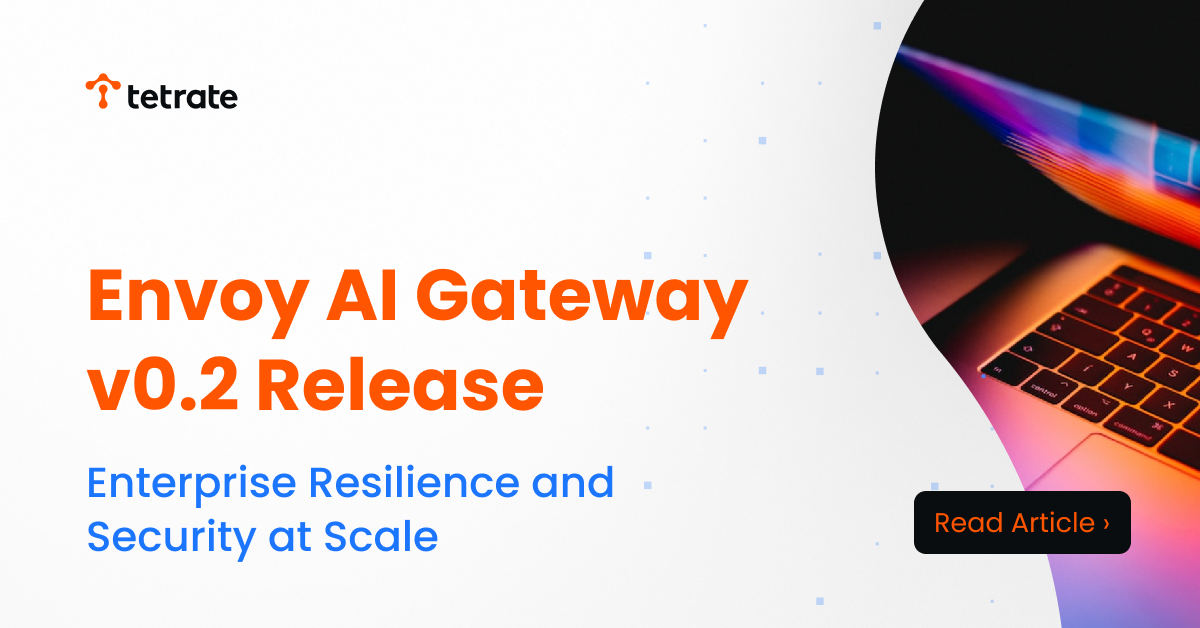Envoy AI Gateway v0.2: Enterprise Resilience and Security at Scale
The v0.2 release of Envoy AI Gateway introduces critical enterprise-grade features including Azure OpenAI integration, cross-backend failover, and enhanced security, establishing the foundation for resilient AI infrastructure at scale.

Just months after announcing the first release of Envoy AI Gateway Envoy AI Gateway v0.2 was released. This release transformed the project into a foundation for enterprise use, introducing critical capabilities that address the core challenges enterprises face when deploying AI at scale.
Where v0.1 established the unified API layer for AI service integration, v0.2 focuses on the pillars every enterprise demands: resilience, security, and operational excellence. These aren’t just feature additions—they represent the foundational requirements that separate experimental AI deployments from production-grade enterprise infrastructure.
Read the full release notes on the Envoy AI Gateway website for more details.
Why Enterprise Readiness Matters for AI Infrastructure
As we integrate with AI providers, outside of our networks, we need to consider resiliency and security beyond traditional ingress gateway concerns.
For Envoy AI Gateway for example, we need to consider:
- High availability expectations: AI features increasingly power critical business operations
- Usage cost optimization: Different providers have varying models, pricing, and capabilities
- Provider Enterprise Security Integration: Provider-specific authentication mechanisms (OIDC, Entra ID, AWS IAM, etc.)
Envoy AI Gateway v0.2 addresses these challenges head-on with enterprise-grade resilience features.
Cross-Backend Failover: High Availability for AI Services
The centerpiece of v0.2’s resilience improvements is cross-backend failover and retry logic—a sophisticated system that ensures your applications can access AI services even if one provider is unavailable for any reason (cost, rate limiting, provider outages, etc.).
Priority-Based Provider Fallback
The new failover system implements intelligent routing logic that automatically redirects traffic when higher-priority AI providers become unavailable:
# Example configuration showing provider priority
backendRefs:
- name: provider-primary # Primary
priority: 0
- name: provider-fallback-1 # 1st Fallback
priority: 1
- name: provider-fallback-2 # 2nd Fallback
priority: 2You can use this approach to achieve:
- Cost optimization: Route to preferred (often less expensive) providers first
- Performance consistency: Maintain service quality during provider outages
- Risk mitigation: Reduce dependency on any single AI provider
Enterprise Security: Adding Azure OpenAI
Security remains important for enterprise AI deployments, and v0.2 expands the security foundation with comprehensive Azure OpenAI integration.
In 0.1 we supported API Key authentication to providers like OpenAI and Mistral, and AWS IAM, and AWS OIDC Integration to AWS Bedrock.
Enterprise-Grade Authentication
The Azure OpenAI integration introduces production-ready authentication mechanisms:
- Enterprise Authentication: Support for Azure Active Directory and Entra ID
- Enterprise Proxy Support: Configuration for corporate network environments
Multiple Route Support: Enterprise-Scale Configuration Management
The addition of multiple AIGatewayRoute support addresses a critical limitation for enterprise deployments:
- Team autonomy: Different teams can manage their own routing configurations
- Service isolation: Better organization of routing rules across business units
- Scalable management: Eliminates bottlenecks in route configuration management
This capability is essential for organizations where multiple teams are deploying AI-powered applications independently.
The Open Source Advantage for Enterprise AI Platforms
What makes Envoy AI Gateway unique is that enterprise needs are being addressed in an open source project together with enterprise end-users contributing to the project.
This approach delivers tangible benefits:
- User-tested features: Capabilities like cross-backend failover and vendor-specific integration emerge from actual enterprise deployments, not theoretical requirements
- Transparent development: Enterprise users can see exactly how their needs are being addressed and contribute improvements
- Shared innovation: One organization’s production challenge becomes a solved problem for the entire community
- No vendor lock-in: Enterprises retain full control of their AI infrastructure
Looking Forward: The Enterprise AI Infrastructure Future
Envoy AI Gateway v0.2 represents more than an incremental update, it’s enhancements for resilience and security creates a foundation that enterprises can confidently build upon.
Upcoming Capabilities
The roadmap ahead continues to focus on enterprise and cloud-native AI platform needs:
- Google Gemini and Vertex AI integration: Expanding the multi-provider ecosystem
- Anthropic Integration: Additional provider options for diverse AI workloads
- Support for the Gateway API Inference Extension: This will allow Envoy AI Gateway to be used as a Kubernetes-native AI Gateway
Ready for Enterprise AI at Scale?
If your organization is serious about deploying GenAI at scale while maintaining the security, resilience, and control that enterprise environments demand, we’d love to help.
Beyond Gateway solutions, managing AI traffic at scale requires a platform approach. Tetrate’s product Agent Operations Director, is a platform for Runtime visibility and governance for ML infrastructure teams to maximize GenAI ROI.
Contact Tetrate to discuss how we can support your enterprise GenAI deployment strategy.
Resources:
The future of enterprise AI isn’t just about having access to AI services—it’s about having the infrastructure to deploy them reliably, securely, and at scale. Envoy AI Gateway v0.2 is building that foundation.










